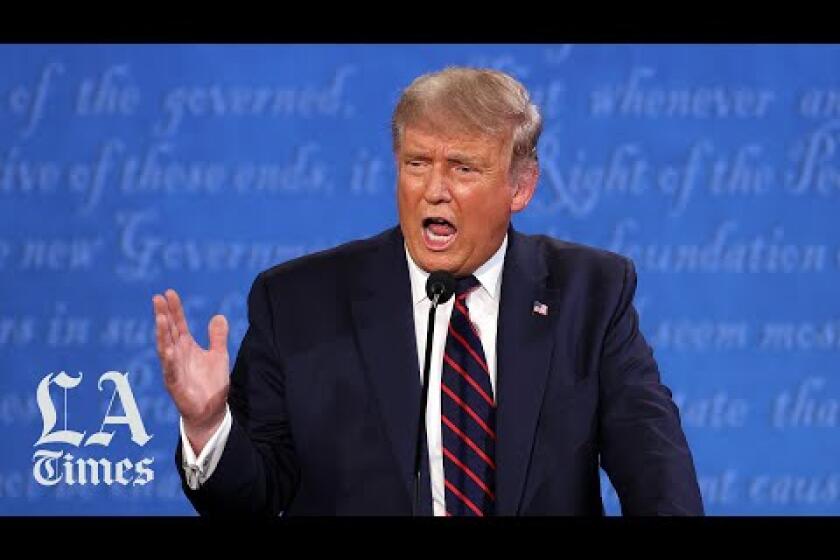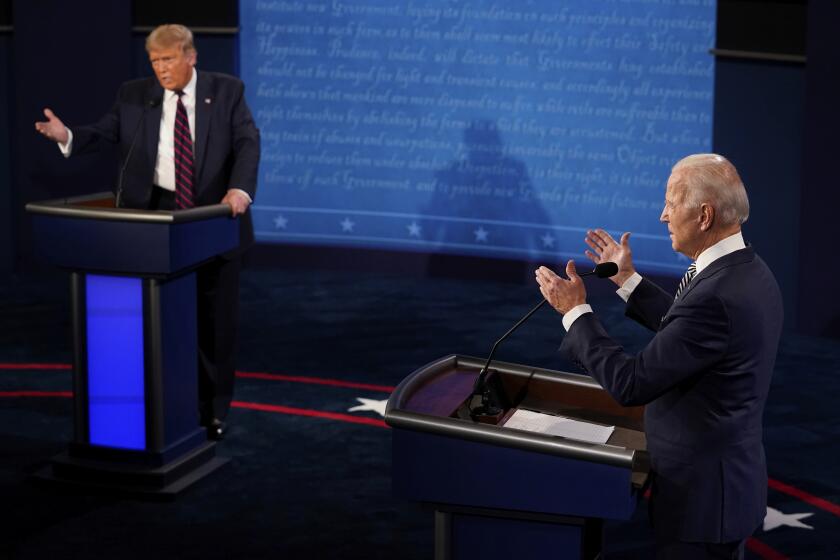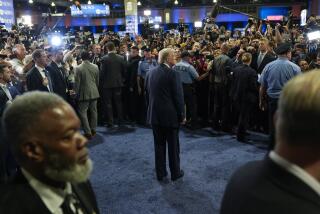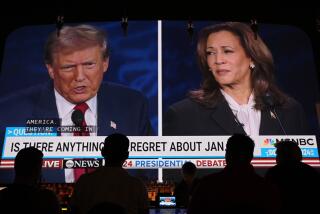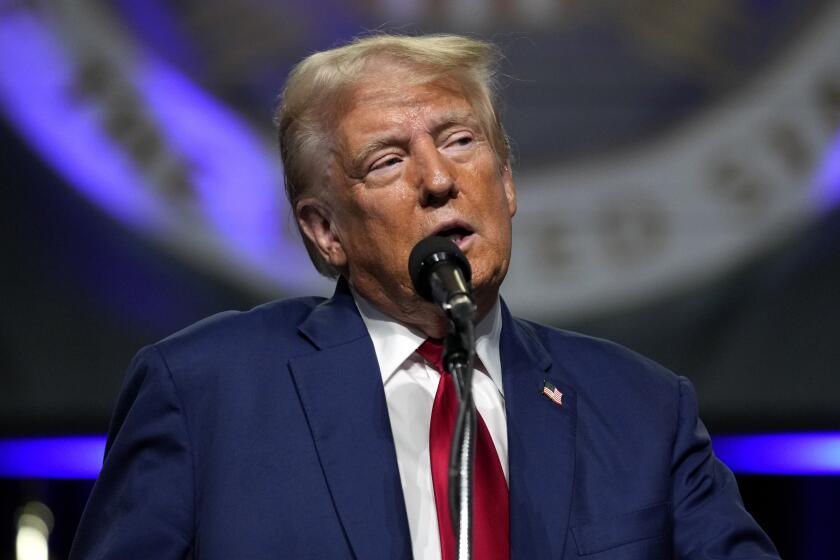Republicans fear Trump’s debate comments on white supremacy could harm them in November
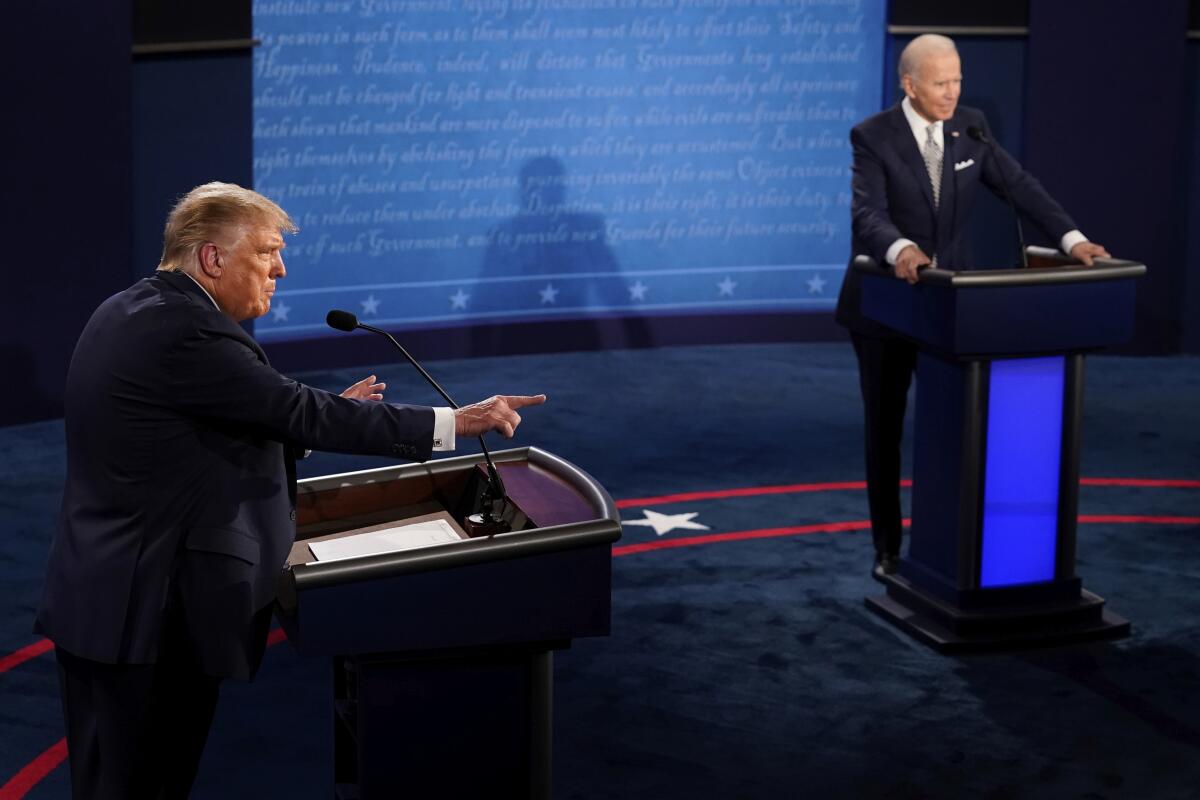
ALLIANCE, Ohio — President Trump’s volcanic debate performance put his sympathy for white supremacists in the campaign spotlight Wednesday, heightening a sense of menacing chaos in the race that threatens to undercut other Republicans up for reelection in a year that was already a challenge for the GOP.
The fallout from the first presidential debate plunged Republicans into cleanup mode, with even some of the president’s closest allies acknowledging his combative approach may have backfired and urging Trump to more definitively disassociate himself from violent white nationalists.
By midday, the president distanced himself from his most inflammatory debate remark — a call to the Proud Boys, an extremist group, to “stand back and stand by” — saying that he didn’t know the organization.
“Whoever they are, they need to stand down,” Trump said. He also said he “always denounced any form of” white supremacy, despite failing to unambiguously do so Tuesday night.
His Democratic rival, Joe Biden, seized on the chance to revisit the themes that had propelled the former vice president’s bid — a restoration of the nation’s character that had been degraded by political coarseness and racial animus.
“Last night I think was a wake-up call for all Americans,” Biden said during a campaign event in Alliance, Ohio — one of seven stops in a train tour Wednesday through two key states, Ohio and Pennsylvania.
He blasted Trump for his “dog whistle to white supremacy,” particularly his words for the Proud Boys. Biden issued his own message to the far-right hate group: “Cease and desist.”
When debate moderator Chris Wallace asked President Trump to condemn white supremacists, he instead called on the Proud Boys hate group to ‘stand back and stand by!’
Appearing before supporters at a rally in Duluth, Minn., on Wednesday night, Trump presented a cheery assessment of his debate performance.
“The verdict is in and they say that we — we, all of us — won big last night,” he said, even as he complained of having two debate opponents — Biden and the moderator, Chris Wallace of Fox News. (Two public snap polls of debate viewers showed Biden winning the debate — 60% to 28% in a poll by CNN, and a closer outcome, 48% to 41%, in one by CBS.)
Trump made no mention of the white supremacy exchange that had disquieted many in his party. But he continued his use of nativist rhetoric that has thrilled hate groups, such as falsely stating that Biden had a plan to inundate Minnesota “with a historic flood of refugees.”
Few others enjoyed the helter-skelter nature of the Tuesday night face-off, including the Commission on Presidential Debates, the nonpartisan nonprofit entity that has sponsored all general election presidential and vice presidential debates since 1988.
The commission acknowledged changes were needed to facilitate “a more orderly discussion of the issues,” and announced that it plans to “ensure that additional tools to maintain order are in place for the remaining debates.” The organization did not specify what those changes would entail; the next presidential debate is Oct. 15, while the vice presidential contenders will meet Oct. 7.
The news was immediately panned by the Trump campaign, which accused the commission of siding with Biden.
“They shouldn’t be moving the goalposts and changing the rules in the middle of the game,” campaign spokesman Tim Murtaugh said.
Trump’s signature pugilistic approach has enthralled his core backers, who have loyally stuck with the president. That base comes up well short of a majority, however, both nationally and in key battleground states.
“His supporters will stay with him. He didn’t lose anyone. But there’s still a small sliver of undecided voters to think about,” said Mike DuHaime, a veteran Republican strategist, who noted a performance like Trump’s on Tuesday “would normally drive away undecided voters.”
Trump’s aides have been hoping to reshape the final weeks of the campaign in terms that Republicans think work to his advantage — as a choice between himself and Biden, whom he portrays as a tool of the Democratic Party’s extreme left wing.
The reaction to the debate, however, appeared to lock in the current framework of the race — a referendum on Trump, which has clearly favored the Democrats.
“It feels like 2018 all over again,” said GOP pollster Neil Newhouse, referring to the midterm elections that delivered gigantic losses for the party and turned control of the House over to Democrats. That election “was a referendum on Donald Trump, and this year feels exactly the same way. Republicans don’t fare well in that kind of election environment.”
Even many of his staunch supporters strained to make sense of his comments and spin them in a favorable light.
Brian Kilmeade, a Trump-friendly host on “Fox & Friends,” the president’s favorite television show, expressed sharp disappointment.
“Donald Trump ruined the biggest layup in the history of debates by not condemning white supremacists. ... That’s like, are you against evil?” he said. “Why the president didn’t just knock it out of the park, I’m not sure.”
Conservative shock jock Rush Limbaugh, whom Trump awarded the Medal of Freedom this year, lamented that the president “undermined his own strategy.”
Elected Republicans urged Trump to clarify his remarks.
“I think he misspoke, I think he should correct it,” said Sen. Tim Scott (R-S.C.), the only Black Republican senator. “If he doesn’t correct it, I guess he didn’t misspeak.”
It took repeated questions from reporters on Wednesday about white supremacists for Trump to affirmatively denounce them. His initial response emphasized “law and order,” a continual trope of his reelection bid, and he then quickly pivoted to challenge Biden to be more forceful in his own condemnation of violent left-wing groups.
The controversy echoed the blowback over Trump’s handling of white supremacist violence in Charlottesville, Va., three years ago, when he said there were “very fine people on both sides, “ comments that Biden said spurred him to run for president.
President Trump and former Vice President Joe Biden faced off in Cleveland in their first presidential debate.
The aftermath of the debate could pose a threat not only to the president, who has trailed Biden for months, but also to Republicans up for reelection in swing states, such as Sen. Susan Collins of Maine, who are already struggling to keep the backing of Trump supporters while distancing themselves enough from the president to woo undecided voters.
Collins said Wednesday that there was “fault on both sides” for the acrimonious debate, and added that Trump had made a mistake in not condemning white supremacy more forcefully.
The tumult could also hurt Republican efforts to hold on to swing congressional districts in the nation’s suburbs.
“Many found the entire debate disturbing,” said Sarah Chamberlain, president of the Republican Main Street Partnership PAC, a group that supports the dwindling band of GOP centrists in the House.
“Our polling shows he damaged the brand in suburban areas,” she said.
The Biden campaign reported it raised nearly $10 million in the three hours during and after the debate and garnered nearly 100,000 new sign-ups for volunteers. The Trump campaign did not respond to requests for equivalent fundraising figures.
On Wednesday, Biden tried to recast the focus on Trump’s disconnect from everyday voters, a theme he labored to get across in the din of the debate.
“What I saw last night was all about him,” Biden said. “He didn’t speak to your concerns or the American people even once.”
The former vice president’s whistle-stop tour through eastern Ohio and western Pennsylvania cuts through the heart of territory handily won by Trump in 2016. The Biden campaign sees potential to peel off some of the region’s white working-class voters by emphasizing the president’s mishandling of the pandemic and their economic woes that predated COVID-19.
The president’s bellicose approach to the debate could provide Biden with more opportunity to sway white women without a college degree who were originally drawn to Trump’s unorthodox style and political outsider persona four years ago, said Celinda Lake, a Democratic pollster.
“That persona became a governing style that came right into their kitchens and dining room tables,” said Lake, who works with the Biden campaign. “It affected whether their grandkid can go to school, it affected whether they could see their mother or elderly friend in an assisted living facility.”
Hook reported from Washington, Stokols from Alliance and Mason from Los Angeles. Times staff writers Evan Halper, Chris Megerian, Sarah D. Wire and David Lauter in Washington contributed to this report.
More to Read
Get the L.A. Times Politics newsletter
Deeply reported insights into legislation, politics and policy from Sacramento, Washington and beyond. In your inbox three times per week.
You may occasionally receive promotional content from the Los Angeles Times.
